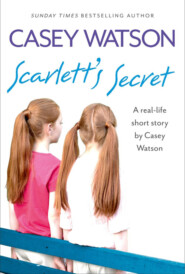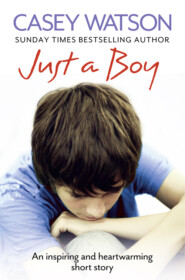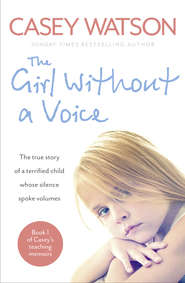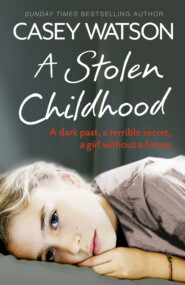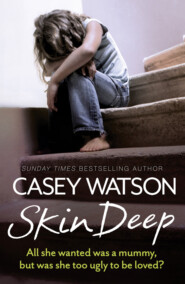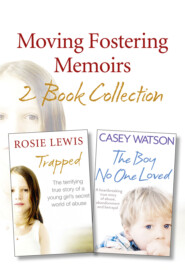По всем вопросам обращайтесь на: info@litportal.ru
(©) 2003-2025.
✖
Angels in Our Hearts: A moving collection of true fostering stories
Настройки чтения
Размер шрифта
Высота строк
Поля
With fostering, there are times when my attention is stretched a little too thinly and, I muse with a twinge of guilt, we have experienced a number of difficult placements over the years. Kissing their heads, I remind myself that there are lots of positives for birth children in fostering families and at least I’m around for them at the end of the school day.
Before her last bottle I attempt a shower. Securing Sarah in her bouncy chair, I flick the switch to vibrate and carry her to the bathroom. She immediately objects, traumatised by the separation. In record speed I remove my clothes and jump into the steamy hot jets, her howls already at fever pitch. Within seconds her face is purple and she’s reached the holding breath stage so I stumble out and wriggle into my dressing gown even though I’m still soaking wet.
We both sigh with relief when she’s back in my arms, her ear pressed against my heart. With pyjamas damp and twisted, I climb into bed, Sarah’s tiny ribs vibrating against mine as her sobs subside. The arm she is resting on falls asleep but she is so peaceful that I dare not move to get the blood flowing. Barely twenty minutes later she starts to howl again, the muscles in her tiny body trembling violently.
By 3 a.m. I shiver with exhaustion as I offer her a third bottle in as many hours. She only seems able to take half an ounce or so at a time, her stomach making sounds like mini-explosions as she feeds. Sinking my head back, I close my eyes and pray for some reprieve, only to be woken minutes later by an inordinate volume of milk soaking my chest. How she manages to bring so much up I’ll never fathom, with her taking so little in.
Back on my feet, I pace the room but this time even movement won’t soothe her. Her piercing shrieks addle my brain and I start to panic, until it occurs to me to sing.
My voice croaky from tiredness, I stand at the window with Sarah in my arms and sing ‘Hush, Little Baby’. I didn’t even realise I knew all the words. Serenading the empty moonlit street, I wonder if I’m the only person awake in the whole of the north of England. My head thuds with exhaustion and I sing with my eyes half-open, just enough to make out her shape through my eyelashes. I’m surprised to find her watching me with a little frown, as if she’s trying to make sense of every tuneless word.
As she clenches a tight hold of my finger and locks eyes with mine, I’m filled with renewed confidence that we’ll both get through this ordeal just fine.
When I wake at 5:30 a.m. the low thud in my head has become a throbbing pain, my crusty eyes aching. I catch a glimpse of myself in the bathroom mirror and quickly look away, deciding my time will be far better spent trying to make the house look neater than attempting the mammoth task of tidying myself up. Desmond, my supervising social worker, and Sue, Sarah’s own social worker, are visiting this morning for the placement planning meeting and I want to appear as if I’m in full control. After waving my own children off to school I scan the living room, hardly knowing where to start. I’d forgotten how someone so little can cause such an inordinate amount of chaos.
Tucking her nappies and wipes in the magazine rack, my back strains with the effort of cleaning with Sarah attached to my chest. I decide to give up and let them take me as they find me. I’ll be no use to anyone if my back goes. An hour later, as I make one final effort by sweeping the detritus of the morning into the cupboard under the stairs, the doorbell rings.
‘Hi, Desmond,’ I say, genuinely pleased to see him. Desmond has been my link worker from the fostering agency ever since I registered, and we quickly established a rapport. Only a few years older than me and with a Scottish lilt to his voice, I feel comfortable in his company and able to speak to him with complete frankness, something I fear I will be unable to do in the presence of the social worker who follows him in.
I have never met Sue before – a tall, formidable-looking woman in her fifties with short, permed black hair. As I welcome them into the living room, Sue fills the space with the scent of her musty perfume. ‘Can she breathe in that thing?’ she asks, arching her pencilled-in eyebrows at the harness.
She reminds me of my old religious studies teacher, her disapproving voice strained after years of being hugely irritated by unruly children.
‘Of course, she’s comforted by the closeness and …’ I answer falteringly before trailing off. Sue has sat herself down and is removing a diary from her large canvas bag, not even listening. Desmond raises his eyebrows.
‘Well, I can’t stay long.’ Sue thrusts a copy of the placement agreement towards me and I smile weakly, tiredness minimising my ability for small talk. ‘Check through and sign the last page. I need to get back to the office before lunch.’
Within ten minutes and without even asking how the baby is doing, Sue informs me that I must take Sarah for contact with her birth mother in the morning. Then, with a withering expression, she says goodbye.
The next morning I wake to a leaden, cold sky. It rains hard and steady from 5 a.m. and continues incessantly as I drive along unfamiliar country roads and through the black wrought iron gates of the psychiatric hospital. Stumbling through the sodden lawns with Sarah sleeping in the car seat lodged in the crook of my arm, my socks wringing wet and clinging to me, I feel a stab of irritation towards Sue, Sarah’s social worker.
During her whirlwind visit she neglected to mention that Sarah’s birth mother had been detained under a section of the Mental Health Act 1983 after attacking one of the midwives with her dinner fork. Taking a deep breath to calm myself, I stagger across the sprawling grounds towards the hospital, wondering whether the car-seat manufacturer enjoys a practical joke with its customers by putting rocks in the base of their products. Bare trees cast skeletal shadows across the grounds and rolls of barbed wire atop the high boundary walls are a reminder that the hospital building, a large old country house with ivy-covered red brick, is not the setting for an episode of Downton Abbey.
A strong smell of antiseptic hits my nostrils as I enter the cavernous lobby. The receptionist checks my ID and directs me towards the quiet room where I am to meet Sue. A nurse, bespectacled, with a touch of rosacea on her cheeks, gives me a sidelong glance. ‘Can I help?’ she asks in a slightly suspicious tone, probably wondering why on earth I’d bring a baby to a place like this.
Sue suddenly appears in the corridor, flanked by another member of staff. ‘This way,’ she trills. The attendant, a stout, short woman with cropped hair, leads the way down another bleak corridor, this one separated by several iron doors. Reaching for the large bunch of keys hanging from her waist band, she turns to us. ‘Stay near the door so you’ve got a quick exit if you need one,’ she mouths, ushering us into a side room.
Alarmed, I stare wide-eyed at Sue but she waves her hand. ‘It’s alright, I’ll be right beside you.’ Suddenly I find her redoubtable presence hugely reassuring and wonder if I’d be just as forbidding after twenty years doing her job.
The room is small and at the far end an overweight young woman lies face down on a bed. Barely out of her teenage years, she lifts her head slowly as we enter the room, such a delayed reaction that I wonder if she is heavily sedated.
‘Morning, Sam,’ Sue says, briskly. ‘You’ve only got half an hour’s contact so come along, sit yourself up.’
Obediently, Sam rises, her flimsy T-shirt riding up. Deep scarlet stretch marks and sagging skin remind me how recently she gave birth. The young woman glances towards me through a curtain of dark, lank hair with heavy, swollen eyes. She meets my gaze and I smile but she doesn’t respond, looking quickly away. From outside I can hear the constant murmur of voices, the occasional sound of running feet. My palms begin to sweat.
‘Hello, Sam.’ Smiling nervously, I release the baby from her papoose. Sarah immediately objects, drawing her legs to her stomach and yowling. Wary of making any unexpected moves, I glance towards Sue for direction.
‘Yes, go on, hand her over,’ she says in a tone that tells me she is accustomed to being obeyed.
Gently, I lay Sarah in her mother’s waiting arms. A dank, unwashed smell rises from Sam’s body and I feel a moment’s revulsion. Sarah screams and her mother takes this as a signal of hunger, lifting her T-shirt and releasing one of her pendulous breasts. With armpits raised the smell intensifies and I take a few steps back, forcing myself to focus on an unpleasant-looking stain in the middle of the carpet.
Oblivious to my embarrassment, Sam ‘encourages’ Sarah to latch on by slapping her over the face with an engorged nipple. Sarah tries to wriggle away from the mammary onslaught, throwing her head wildly from side to side. She yowls piteously, her skin the colour of beetroot.
Sue remains near the doorway, her expression watchful. Sam groans at her baby’s refusal to co-operate and I can sense her growing impatience. A vein throbs in my temple as maternal protectiveness roars up in me but I set my jaw and force myself to ignore it. It’s easy to forget that I have no rights to this baby. My eyes flick between Sue and Sarah, feeling utterly helpless. The social worker appears too engrossed to perform a rescue, scribbling away in her notebook.
‘I have a bottle in my bag if you’d prefer …’ I offer in a quiet voice.
‘Oh, for fuck’s sake.’ Sam releases her grip and Sarah’s tiny head, downed with a thatch of hair the same colour as her mother’s, lolls back awkwardly. ‘Why won’t she shut up?’ She looks up at me accusingly. ‘’ere, take her.’
Biting down a sudden spasm of contempt, I take the sobbing baby into my arms and rock to console her. Her sleep suit is damp with perspiration. Had Sam shown some concern for her child, some remorse, I might have felt more empathy. Did she not realise the suffering her addiction had caused?
‘Contact suspended for today,’ Sue announces, snapping her notebook shut.
Sam stares rigidly ahead as I back towards the door, her face expressionless.
It’s funny how quickly our family adjusts to the needs of new arrivals, how normal it all becomes. When Sarah has been with us for almost four weeks, I pick her up from her cot and realise that the wail that was so nauseating in its pitch during her first fortnight has already toned down to an ordinary cry.
Encouraged, once the children leave for school I crank the heating up, then run the bath. Affronted by being undressed, Sarah shrieks, her features crumpling with rage but as I lower her into the warm water, her muscles instantly loosen. Her feet, usually arched in pain, flex and begin to wriggle in the solace of the water. Her legs fall open at the knees and tiny hands stretch to form a starfish.
Wrapped in a towel I take her back downstairs and lay her on the fluffy rug in front of the fire, amazed that she is still lying contentedly despite not being attached to my chest. Rubbing my hands together to warm them, I roll her onto her tummy and her head rests to the side. Confusion crosses her features and she opens her tiny mouth to protest but as I massage the soft skin on her back with gentle fingers she relaxes, expelling a tiny breath of air.
Witnessing Sarah as she blossoms fills me with a sense of achievement, reminding me of the joy I felt a few weeks into my first placement, eight years earlier. I was daunted when the three young siblings arrived. As they sobbed in their beds I buried my face in my hands, almost as bewildered as they were. A few weeks later I realised that trusty old-fashioned love, routine and discipline is often all the expertise that is needed to see a transformation.
When she’s dressed and back in her blanket I drop her next feed into a jug of hot water and hold her in my arms at the garden door while we wait for the milk to warm. Her eyes flicker to our horse-chestnut tree, the bare branches swaying in the winter breeze. ‘When summer arrives we’ll be out there on the grass, warming our feet in the sun,’ I tell her as I brush a kiss on her soft cheek and inhale her sweet, infant scent. Rocked by a sudden feeling of déjà vu, I realise she smells the same as my own babies did.
Her hand rises up out of the blanket and searches the air, coming to rest inside the collar of my cardigan. She clenches it and I coo at her, tilting her up to kiss her cheek. With parted lips, her eyes narrow and she bestows a fleeting, crooked smile. A sudden rush of love besieges me. No, don’t let yourself, I silently counsel.
By the end of our fifth week together, when Emily and Jamie leave the house I light the coal fire to bring a bit of cheer into the living room and turn the radio to Smooth FM. Sarah turns her head and watches as the flames sputter into life, her legs scissoring jauntily in response to the music. I’m thrilled. Clearly the drugs in her system haven’t adversely affected her hearing.
Bending on all fours, I lift her vest and lean in to kiss her tummy. She gurgles in delight, her pleasure bolstering my decision to reject the safer caring plan presented to me when I first registered as a foster carer. One of the conditions of the plan is that carers must agree never to tickle foster children. I refused, only signing when that particular condition was removed. Several other carers followed suit, in agreement that there are times when tickling is appropriate. Of course, I wouldn’t launch myself on a child who may have been sexually abused but why shouldn’t a newborn baby know what a raspberry feels like, just because they’re a ward of the state?
Worn out by the excitement, she begins to grizzle so I wrap her in a blanket and gather her in my arms, settling the two of us on the sofa. She lies for a few moments looking up at me as I hold her snugly. Watching her eyes flicker, my head drops back and for a few minutes we doze together.
The telephone jerks me awake. Irritated, I reach for the cordless phone with my spare hand.
‘Hello?’
‘Hi, Rosie.’ It’s Desmond. He hesitates for a moment and I tense, sensing bad news. Complaints against foster carers are common, particularly when mothers see another woman cradling their own newborn baby.
‘Oh dear. Go on, what’s up?’
‘The local authority is moving Sarah on to other carers, quite soon. Next week in fact.’
‘Moving her? Why?’ I glance down at her peaceful face, feeling suddenly angry. I had heard of children moving foster placements for financial reasons. Social services make an effort to place their looked after children with locally registered carers but if they are full or they refuse a placement, agency carers are employed. If a local authority carer then becomes available, the child is sometimes moved on, even if they’ve been settled somewhere for a considerable amount of time. I close my hand around the receiver so tightly that the muscles in my arm begin to ache.
‘Don’t worry, it’s not what you think. The local authority have a couple who have just passed panel and are desperate to adopt a baby. They registered specifically for that reason. The sooner she’s settled, the better.’
I feel as if a cold band is clamping around my heart. I know he’s right, of course. It will be wonderful for Sarah to get the inevitable move over with while she’s so young, so that the new couple are all she’ll ever remember. It’s a system that has worked well in the US and I had read somewhere that various local authorities were trialling the procedure in the UK. The couple risk heartbreak if the local authority is unsuccessful in their application for a full care order, but if Sarah becomes available for adoption, she’ll be settled in a permanent home much sooner than is usual.






